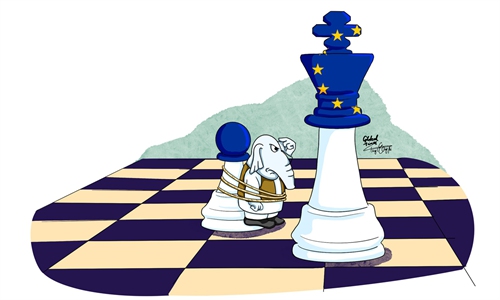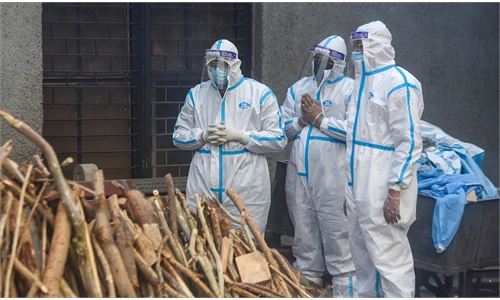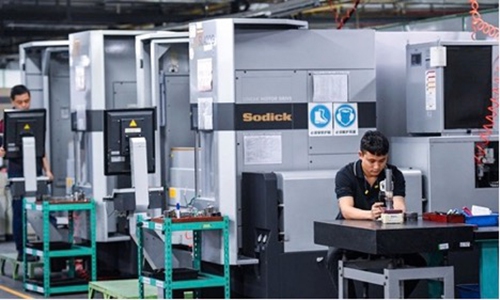COMMENTS / EXPERT ASSESSMENT
Will Modi's 'Make in India' campaign end up as a pipe dream?

Illustration: Tang Tengfei/GT
A Foxconn factory in India has reportedly seen its output of iPhone 12 slumped more than 50 percent amid a ferocious COVID-19 resurgence, as workers infected with coronavirus have had to leave their posts.The factory is located in India's southern state of Tamil Nadu, one of the worst hit states during the latest resurgence; over 100 Foxconn employees in the state have tested positive for the virus, the Reuters reported on Tuesday, citing anonymous sources.
With India's current epidemic crisis showing little sign of easing down and death tolls exceeding 250,000 on Wednesday, Foxconn's production is not the only one to be impacted. And New Delhi's ambitious "Make in India" campaign, one of the core economic strategies of the Modi administration, may not be able to avoid a heavy blow; multinationals may think twice when it comes to their Indian plans.
Against the backdrop of China's industrial upgrading and intensifying tensions between China and the US over the past few years, India once has been viewed as a promising candidate for multinationals to diversify their manufacturing from China. New Delhi has also been trying to take the opportunity to take over part of the capacity or even replace China's role in the global value chain, so as to march toward its goal of becoming a leading economic power across the world.
Now the opportunity is slipping away. Though whether it would be a fatal blow for Modi's Make in India policy remains to be seen, the agenda for global producers eyeing India as a top choice for industrial chain reset has clearly put off.
According to an industrial report by Counter Point Research on May 3, iPhone production in India, which had been increasing until 2019, showed a significant decline in 2020. If India cannot put the resurgence under control swiftly, factories like Apple's suppliers are highly likely to reconsider their plans in the market.
Firms arrange production based on conditions of manufacture. Not only that the advantageous external environment for India is diminishing, the largest South Asian country itself has shown little progress in improving its business environment, for instance, inefficient labor, unsatisfactory infrastructure, endless internal strife among different political and interest groups, all dimming the prospect of the nation's industrial development, as well as its economic recovery in post-COVID era.
By sharp contrast, China has been one of the earliest countries in the world to put the outbreak under control and effectively resumed production. Though Apple had been shifting out its production from China before 2020, as Counter Point reviewed, it has been stopped by the COVID-19, and its production in China in 2020 returned back to 2017 levels.
While Indian economy looks increasingly bleak, its status among the regional industrial chains may keep declining too. Members of Association of Southeast Asian Nations (ASEAN), such as Vietnam, with a better production condition and more opening-up environment, are more ideal choices to take over any capacity moving out from China, especially with the mega free trade deal of Regional Comprehensive Economic Partnership coming into effective.
In the meantime, with a relatively small-scale of market and limited production factors, though some Southeast Asian countries are gaining weight among Asia's value chain, it cannot change the overall picture of China remaining the center of gravity.
As for India which is trapped in internal political chaos and externally kidnapped by the US-led clique's pushing the so-called Indo-Pacific strategy aiming to confront China, if it cannot shed its geopolitical mindset and address critical economic development, an effective recovery may become increasingly difficult. Odds are this chaos will render Modi's "Make in India" campaign nothing more than a pipe dream.
The article was compiled based on an interview with Zhao Gancheng, a research fellow at the Shanghai Institute for International Studies. bizopinion@globaltimes.com.cn



